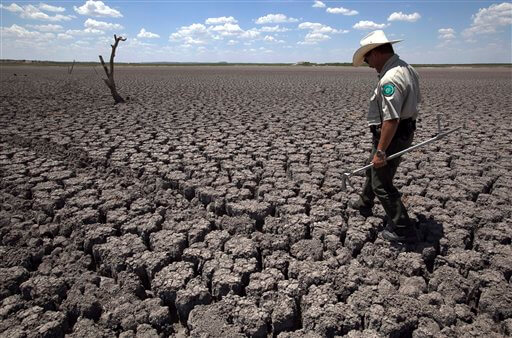
Last year brought a record heat wave to Texas, massive floods in Bangkok and an unusually warm November in England. How much has global warming boosted the chances of events like that?
Quite a lot in Texas and England, but apparently not at all in Bangkok, say new analyses released Tuesday.
Scientists can’t blame any single weather event on global warming, but they can assess how climate change has altered the odds of such events happening, Tom Peterson of the National Oceanic and Atmospheric Administration told reporters in a briefing. He’s an editor of a report that includes the analyses published by the Bulletin of the American Meteorological Society.
In the Texas analysis, researchers at Oregon State University and in England noted that the state suffered through record heat last year. It happened during a La Nina weather pattern, the flip side of El Nino. Caused by the cooling of the central Pacific Ocean, La Nina generally cools global temperatures but would be expected to make the southern United States warmer and drier than usual. But beyond that, the scientists wondered, would global warming affect the chances of such an event happening?
To find out, they ran a lot of computer simulations of Texas climate during La Nina years. They compared the outcome of three such years in the 1960s with that of 2008, which was used as a stand-in for 2011 because they were unable to simulate last year. The idea, they said, was to check the likelihood of such a heat wave both before and after there was a lot of man-made climate change, which is primarily from burning fossil fuels like coal and oil.
Their conclusion: Global warming has made such a Texas heat wave about 20 times more likely to happen during a La Nina year.
Using a similar approach, scientists from Oxford University and the British government looked at temperatures in central England. Last November was the second warmest in that region in more than 300 years. And December 2010 was the second coldest in that time.
Their analysis concluded that global warming has made such a warm November about 62 times more likely, and such a cold December just half as likely.
Kevin Trenberth, of the National Center for Atmospheric Research’s climate analysis section, said that he found the Britain study to be reasonable, given what he called a flawed climate model. As for the Texas result, he said that given how the study was done, the calculated increase in likelihood “could well be an underestimate.”
A third analysis considered unusually severe river flooding last year in central and southern Thailand, including neighborhoods in Bangkok. It found no sign that climate change played a role in that event, noting that the amount of rainfall was not very unusual. The scale of the flooding was influenced more by factors like reservoir operation policies, researchers wrote.
Also at the briefing, NOAA released its report on the climate for 2011, which included several statistics similar to what it had announced earlier.
Last year was the coolest since 2008 in terms of global average temperature, which was about 57.9 degrees Fahrenheit (14.4 degrees Celsius.). But it still remained among the 15 warmest years since records began in the late 1800s, the agency said. It was also above average for the period 1980-2010.
___
Online:
NOAA: http://www.climate.gov
Copyright 2012 The Associated Press.


































